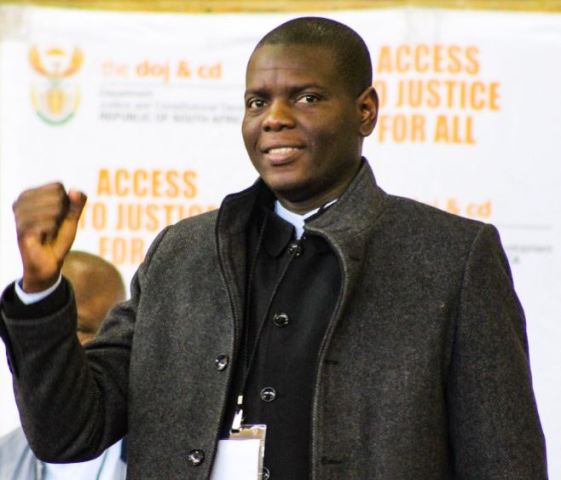Ronald Lamola Calls for Structural Reforms to Boost Private Investment in Developing Nations
Lamola emphasized that the biggest deterrents to private investment in developing economies are frequent policy shifts, weak institutions, and unpredictable regulatory environments.

- Country:
- South Africa
At the 4th International Conference on Financing for Development held in Seville, Spain, South Africa’s Minister of International Relations and Cooperation, Ronald Lamola, issued a compelling call for comprehensive reforms to boost private investment in developing nations. Speaking at the multi-stakeholder roundtable themed “Revitalising International Development Cooperation,” Lamola highlighted persistent structural challenges undermining investment, while offering concrete solutions aimed at sustainable and inclusive growth.
The Investment Climate: Political and Regulatory Volatility a Major Barrier
Lamola emphasized that the biggest deterrents to private investment in developing economies are frequent policy shifts, weak institutions, and unpredictable regulatory environments. These factors, he explained, generate uncertainty that severely limits investor confidence and hampers long-term financial planning.
“Frequent policy shifts, coupled with weak institutions and inconsistent regulatory frameworks, create a climate of uncertainty that undermines investor confidence,” he stated.
He argued that such volatility leads to more complex risk assessments and discourages strategic investments crucial for sustainable development.
Strengthening Institutions and Legal Frameworks
To address these concerns, Lamola advocated for the establishment of independent regulatory bodies and coherent policy frameworks. He stressed the importance of enacting strong investment protection laws that would provide both local and foreign investors with the confidence to commit long-term capital.
“We need robust investment protection laws to foster investor confidence. Without these safeguards, we are undermining our own potential for growth.”
He further noted that simplifying regulatory processes and reducing bureaucratic red tape would help create a more inviting environment for investors.
Macroeconomic Fragility and Its Impact on Investment
Lamola did not shy away from addressing internal economic weaknesses. He identified macroeconomic fragility—marked by high inflation, volatile currencies, and unsustainable debt levels—as a significant challenge.
“These conditions restrict governments’ abilities to provide incentives for investment,” he said, adding that prudent fiscal and monetary policies were crucial to restoring economic stability.
He emphasized that better debt management and deeper partnerships with development finance institutions could pave the way for a more supportive investment climate.
Expanding Financial Markets and Promoting Innovation
The Minister called for urgent efforts to expand and deepen local capital markets, which are often underdeveloped in many low- and middle-income countries. He also highlighted the importance of encouraging fintech innovation and financial inclusion.
“Supporting fintech innovation and promoting financial inclusion are pivotal in creating a more accessible financing landscape,” he said.
Such strategies, Lamola argued, are vital for democratizing access to capital and unlocking entrepreneurial potential across different sectors.
Infrastructure and Capacity Building: Cornerstones for Development
A major thrust of Lamola’s speech focused on the infrastructure gaps that deter private investment. He underscored how poor transport and energy systems escalate operational costs and diminish the profitability of investment projects.
“We need strategic infrastructure planning, informed by private sector insights, to mobilise the capital necessary for development,” he stated.
He emphasized the need for dedicated project preparation facilities and improved technical capacity in the public sector to ensure well-designed, bankable projects.
Governance and Sustainable Finance Strategy
Governance, transparency, and sustainability were key themes woven throughout the Minister’s address. Lamola called for the creation of national sustainable finance strategies that align investment flows with environmental, social, and governance (ESG) criteria.
“We must define what constitutes a sustainable investment. Robust taxonomies and disclosure standards can enhance transparency and credibility in the market.”
He argued that clear ESG guidelines would help investors make more informed and impactful decisions.
The Role of Multilateral Development Banks (MDBs)
Lamola also spotlighted the importance of Multilateral Development Banks (MDBs) in catalyzing investment. He noted that MDBs could offer credit enhancements, support project preparation, and co-finance investments, making them less risky and more appealing to private investors.
“Their involvement can significantly increase the viability of projects in emerging markets.”
This collaborative approach, Lamola argued, can help bridge the financing gap while ensuring that development outcomes remain central to investment decisions.
A Vision for a Collaborative Future
The event concluded on a note of optimism, with Lamola expressing confidence in the power of global partnerships to overcome investment barriers and drive sustainable development.
“Together, we can create a future where every dollar invested unlocks new opportunities, tackles pressing challenges, and builds a more sustainable world.”
The conference reaffirmed the collective commitment of governments, private sector stakeholders, and development institutions to work in unison towards revitalising international development cooperation and mobilising the resources needed to meet the Sustainable Development Goals (SDGs).










